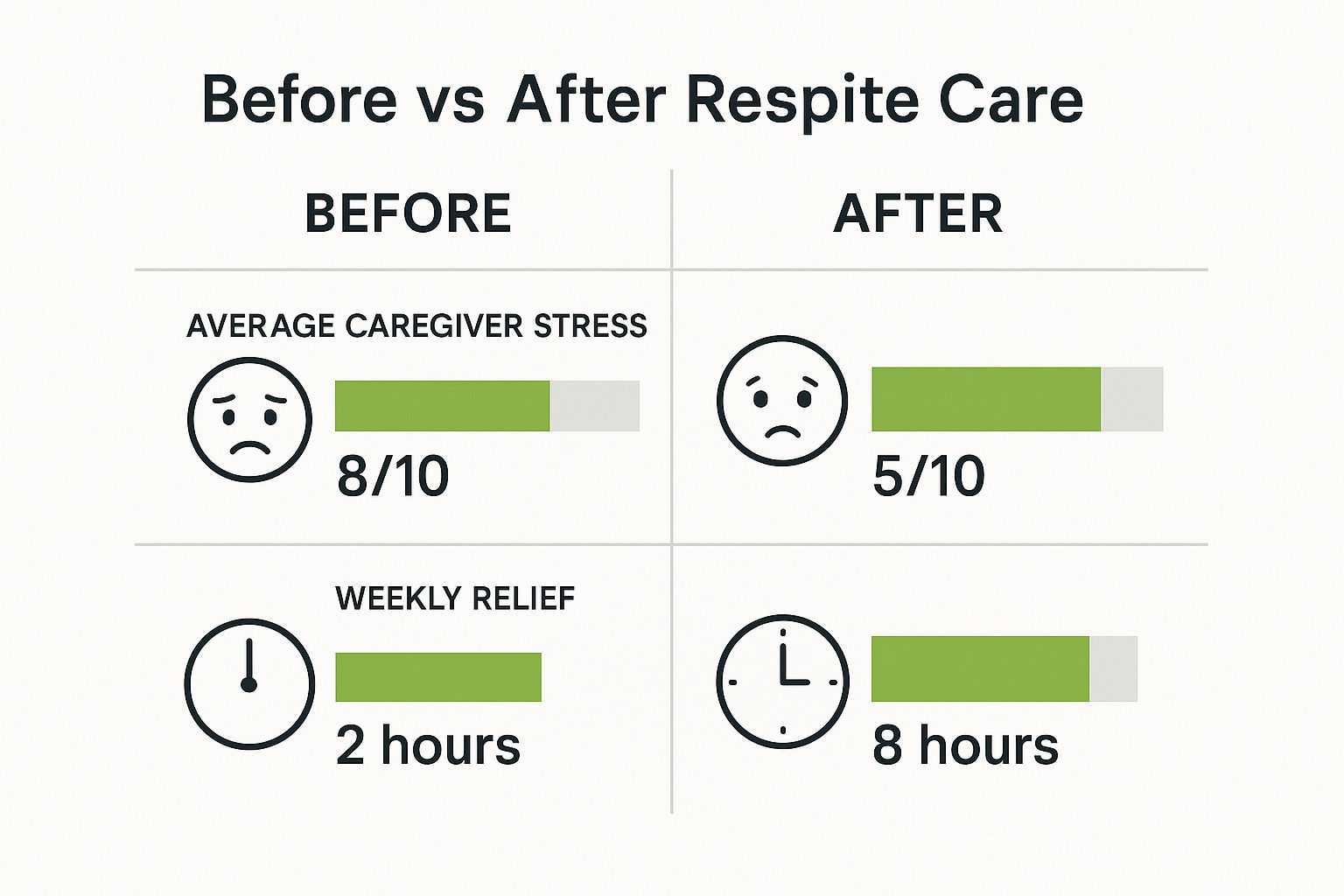Looking after a loved one with dementia is a deeply personal journey, but it’s crucial to remember you don't have to walk that path alone. Respite care for dementia is a specialised form of support that offers a lifeline to primary carers. It gives you a much-needed break, with the peace of mind that your loved one is receiving expert, compassionate care in a safe setting.
Understanding Dementia Respite Care

It’s helpful to think of respite care not as a substitute for you, but as a supportive partner on your caregiving journey. Its main purpose is to give you a genuine break—time to rest, recharge, and look after your own needs. This pause is absolutely vital for avoiding the emotional and physical drain that often leads to carer burnout.
This support system ensures that while you're taking that time for yourself, the person you care for is in a safe, engaging, and well-structured environment. Good respite care is always person-centred, meaning it focuses entirely on the individual's comfort, dignity and wellbeing.
The Growing Need For Support
The contribution of unpaid carers across the UK is enormous, and the need is only increasing. Dementia isn't just a health challenge; it's a huge social and financial one, too. Right now, it's estimated that 982,000 people in the UK are living with dementia, and that number is expected to hit 1.4 million by 2040.
The financial strain is immense. Around 63% of dementia-related costs are paid for by patients and their families, not the state. This just goes to show the heavy load that carers are shouldering. For more detail, the Alzheimer's Society UK provides a lot of insight into the scale of dementia's impact.
Respite care is a way to make caregiving sustainable in the long run. It’s built on the understanding that a carer’s own wellbeing is directly tied to the quality of care their loved one receives. A rested carer is simply a more patient, present, and effective carer.
Who Provides Respite Care Services?
In the UK, several different types of organisations offer specialised respite services for people with dementia. Knowing what’s out there is the first step to finding the right match for your family’s situation.
Key providers include:
- Local Authorities: Your local council’s adult social services department is a great starting point. They can carry out a Carer’s Assessment to help identify your needs and what support is available.
- Private Care Agencies: Specialist providers, like us here at Cream Home Care, offer flexible respite services in your own home, which helps maintain your loved one's familiar routine.
- Charities and Non-Profit Organisations: Many charities, both national and local, offer subsidised respite care, day centres, and incredibly valuable support networks for carers.
Ultimately, the goal is to find a service that helps you protect your own health. This allows you to continue giving the best possible care to the person who depends on you. For a wider look at the topic, you might find our guide on why respite care for the elderly is so important helpful.
Exploring Your Respite Care Options
When you're looking for respite care, the sheer number of options can feel a bit daunting. But really, it’s all about finding the right fit for your family. The UK has a wide variety of support available, so whether you need a few hours off a week or a proper, longer break, there’s likely a solution that works for you.
Each type of respite care for dementia has its own strengths. The trick is to get a clear picture of how each one operates so you can decide what makes the most sense for your loved one—and for you.
In-Home Respite Care
For many, in-home respite care is the most straightforward and comforting choice. A professionally trained carer comes to your loved one's home, which means no unsettling changes to their environment. Staying in familiar surroundings can make a world of difference for someone living with dementia.
This type of care is incredibly flexible. You can arrange for someone to come in for just a few hours while you run errands, for a full day, or even for overnight cover. It’s perfect for keeping routines intact, which is often crucial for minimising confusion and anxiety.
Day Care Centres
Specialist day care centres offer a completely different kind of support: a structured, social, and stimulating day out. These centres are designed to be dementia-friendly, providing a safe space for activities like music therapy, arts and crafts, or gentle exercise, all overseen by experienced staff.
This is a fantastic option if you feel your loved one would benefit from more social interaction. It gives them a change of scenery and a chance to connect with others, while you get a regular, scheduled break. Most centres also provide lunch and can help with personal care.
The infographic below really highlights how much of a difference this kind of support can make to a carer’s daily life, significantly easing stress and freeing up much-needed personal time.

As you can see, even a small increase in support can completely change how manageable the caring role feels.
Residential and Emergency Stays
Sometimes, you need more than just a few hours. For a longer break—maybe for a family holiday or if you need to recover from an illness yourself—residential respite care is an excellent option. This involves a temporary stay in a care home, typically one with a dedicated dementia unit and specialist staff. These stays can range from a few days to several weeks.
This provides 24/7 professional care, giving you complete peace of mind. It can also be a gentle way to test the waters if you’ve been considering a permanent move to a care home down the line.
Emergency respite care is the safety net you hope you never need, but it's vital to know it's there. If a sudden crisis hits—a family emergency or your own health takes an unexpected turn—this support can be arranged quickly. Local authorities and private agencies often have rapid response systems to ensure care is never interrupted.
To help you see how these options stack up, here’s a quick comparison.
Comparing Dementia Respite Care Options
| Type of Care | Best For | Environment | Typical Duration |
|---|---|---|---|
| In-Home Care | Maintaining routines and minimising disruption for the person with dementia. | The individual’s own home. | A few hours to overnight stays. Highly flexible. |
| Day Care Centre | Social stimulation, structured activities, and a regular daily break for the carer. | A dedicated, supervised community setting. | Several hours during the day, once or multiple times a week. |
| Residential Care | Longer breaks for the carer, such as holidays or recovery periods. | A specialised care home or nursing facility. | A few days to several weeks. |
| Emergency Care | Unplanned crises when the primary carer is suddenly unavailable. | Can be in-home or a residential facility, depending on the situation. | As long as needed to resolve the emergency. |
Ultimately, taking the time to understand these different avenues of respite care for dementia helps you build a sustainable support system. Finding the right match ensures your loved one gets the best possible care, and you get the essential break you need and deserve.
The Benefits for Both You and Your Loved One

It’s easy to think of respite care as just a break for the carer, but the truth is, it benefits everyone involved in a really meaningful way. It isn't just about stepping away; it's about creating a healthier, more sustainable way of caring for your loved one and, just as importantly, for yourself.
For anyone caring for someone with dementia, burnout is a very real risk. The role is relentless, both physically and emotionally. Taking even a short break through respite services can be a lifeline, helping to lower stress, clear your head, and simply recharge your batteries.
When you return, you often find you have more patience and energy. That short space allows you to catch up on other parts of your life, see friends, or just have a quiet cup of tea. It’s absolutely essential for your own wellbeing.
For the Carer: A Chance to Recharge
The difference a proper break can make is immediate. Stepping back, even for a morning, gives you the chance to focus on yourself for a change. And that’s not selfish—it’s a fundamental part of being a good carer in the long run.
Here’s what that looks like in practice:
- Less Stress and Anxiety: Knowing your loved one is safe and well looked after allows you to truly switch off and relax.
- Better Physical Health: It’s all too common for carers to put off their own doctor's appointments or skip exercise. Respite gives you that time back.
- Nurturing Other Relationships: Caring can strain relationships with partners, children, and friends. This is your chance to reconnect and strengthen those bonds.
Beyond just taking a break, it's also about building up your own reserves. Learning how to develop your emotional resilience is a key skill that helps you navigate the tougher days with greater strength.
For Your Loved One: A Positive Experience
For the person living with dementia, respite care is far more than just a babysitting service. It offers a welcome change of pace and the chance to enjoy new, positive experiences in a safe and understanding environment.
Respite care isn’t just about giving the carer a break; it’s about enriching the life of the person with dementia. It offers them social interaction, mental stimulation, and compassionate care from professionals trained to understand their unique needs.
This change of scenery can be incredibly stimulating. Professionals who provide respite care for dementia are experts at creating engaging, personalised activities that support cognitive function and bring joy. This means your loved one receives thoughtful, person-centred care that honours who they are, which ultimately improves wellbeing for the whole family.
You can learn more about how respite care supports families and prevents burnout in our detailed guide.
Navigating the Costs and Finding Financial Support
Let's talk about the financial side of things. For many families, figuring out how to pay for respite care is a major hurdle. The costs can look intimidating at first glance, but it’s important to know there are various support systems across the UK to help make it affordable. The real key is to plan ahead and understand what you’re entitled to.
The price tag for dementia respite care can swing quite a bit, largely depending on the type of care you go for. If someone comes to your home, it's typically an hourly rate. A stay in a residential home, on the other hand, is usually priced by the week. These costs aren't arbitrary; they reflect the specialised environments and highly skilled professionals needed for quality dementia care.
What Does Dementia Respite Care Typically Cost?
You’ll find that specialised nursing care carries a significant financial commitment. For example, the average weekly cost for privately funded nursing dementia respite care hovers around £1,678. Residential dementia care is a bit less, averaging about £1,449 per week, though these prices can vary based on where you live in the UK. For a deeper dive, it's worth exploring a more detailed breakdown of dementia care home costs.
This level of investment covers the intensive, 24/7 support that’s often required. It pays for secure, safe environments and, crucially, for staff who have specific training in dementia care. Always ask providers for a clear, itemised quote so you know exactly what’s included in the price.
Getting Help from Your Local Council
Your first port of call for financial help should always be the adult social services department at your local council. The most important thing you can do is request a Carer's Assessment for yourself and a Needs Assessment for the person you look after. These aren't tests of how well you're coping; they're simply tools to understand your situation and figure out what support you're eligible for.
A Carer's Assessment is your key to unlocking council funding and support. It's free of charge, and you have a legal right to one, no matter what your financial situation is or how much care you provide.
If these assessments confirm you need support, the council will then carry out a financial assessment, often called a means test. This is where they'll look at the income, savings, and assets of the person needing care to work out how much they should contribute. The rules can feel a bit complicated, but the council is there to walk you through the process.
Other Ways to Find Financial Help
Beyond the local council, there are other avenues you can and should explore to lighten the financial load.
- Charitable Grants: Organisations like the Carers Trust and Turn2us have grants specifically for carers who are struggling financially. This money is often flexible and can be put towards a much-needed respite break.
- Attendance Allowance: This is a benefit from the Department for Work and Pensions (DWP) for people over State Pension age who need help with their personal care. It isn’t means-tested, which is a huge plus, and the money can be used for any kind of care, including respite.
- Personal Budgets and Direct Payments: If the council agrees to fund respite care, they might offer you a personal budget. You can often choose to receive this as a direct payment into a bank account, which gives you much more freedom and control to choose the respite provider that works best for you.
How to Arrange Respite Care Successfully

A positive respite experience all comes down to thoughtful preparation. When you plan ahead, you create a much smoother and more reassuring transition for everyone involved, especially for the person you care for. Think of it less as just booking a service and more as building a bridge of trust between your family and the new carer.
Getting a head start, particularly for planned breaks like a holiday, is the best way to lower everyone's stress levels. It gives you the breathing room to find the perfect match for your specific needs. Most importantly, it allows you to gently prepare your loved one, making them feel secure with the change rather than unsettled by it.
Create a Detailed Care and Comfort Plan
Imagine you’re creating a ‘user manual’ for your loved one. A detailed care plan is probably the single most valuable tool you can give a respite carer, as it gives them the insight they need to provide truly personal support. When it comes to dementia care, it’s always the small, familiar details that make the biggest difference in keeping things feeling normal and calm.
This plan needs to go far beyond just medical information and medication times. Jot down everything you can about their daily rhythm, from the time they like to wake up to the specific cup they prefer for their tea. Document their little joys and preferences—the music that soothes them, the TV shows they always watch, or the armchair they feel most comfortable in.
Don’t forget to include calming strategies. Make a note of what comforts them when they feel anxious or confused. Is it a familiar blanket, looking through an old photo album, or simply having someone hold their hand quietly? These insights are gold dust for a new carer.
Preparing Your Loved One and the Provider
When you bring up the idea of respite care, try to introduce it gently. Frame it in a positive way, maybe by focusing on the new activities they can try or the friendly new faces they’ll get to meet. A seamless handover is just as important. Take the time to walk the respite provider through the care plan and, if possible, introduce them to your loved one in a relaxed, informal setting first.
It's also worth noting that when you're making arrangements for someone with dementia, especially around finances and decision-making, it’s so important to have your legal ducks in a row. Taking the time for understanding the importance of Power of Attorney can provide immense peace of mind. For a straightforward look at the process, our guide on home care services in 5 simple steps can help.
Before you make any final decisions, you need to ask the right questions to make sure the provider is genuinely equipped to offer high-quality dementia support. Use this checklist as a guide for your conversation:
- Dementia Training: What specific dementia training and qualifications do your carers hold?
- Safety Measures: What procedures do you have in place to ensure my loved one is safe and to prevent wandering?
- Person-Centred Approach: How do you get to know a person's individual history and preferences?
- Activity Planning: What kind of activities do you offer to keep people engaged and stimulated?
- Communication: How will you keep me in the loop about my loved one’s wellbeing while I’m away?
Why Respite Care Has Become So Crucial
To get a real sense of why respite care matters so much, it helps to look at the bigger picture of dementia support here in the UK. We have an ageing population, which means more and more families are navigating a dementia diagnosis. This puts an enormous strain not just on individual carers, but on our entire social care system.
Because of this growing need, services are stretched thin. Respite care is no longer seen as a ‘nice-to-have’ option; it's now an essential part of any realistic, long-term care plan. Think of it as a planned, professional safety valve for the millions of unpaid carers who are the backbone of dementia care in this country.
A Look at Dementia Care Today
The social care system is under constant pressure to meet the rising demand for dementia support. Thankfully, we have organisations like the Care Quality Commission (CQC) that inspect and rate services, making sure they meet the standards for safe, high-quality care.
But the numbers tell a stark story. The latest figures from England reveal a record 483,000 people aged 65 and over have a formal dementia diagnosis. While the number of care home beds has gone up, it simply hasn’t kept pace. We’re now at a point where there are roughly three care home beds for every four people diagnosed with dementia. That gap is widening. For a deeper dive into the data, you can read the full statistical commentary on the dementia profile.
This shortfall highlights a critical reality: respite care for dementia isn't a luxury. It's an essential pillar of support that helps ease the pressure on residential care while giving family carers the preventative support they desperately need. It’s what allows them to keep going in their vital role at home for longer.
Without these breaks, the risk of carer burnout is huge. Burnout can quickly spiral into a crisis, which then places even more demand on a social care system that’s already at its limit. That’s why organising and using respite care is such a proactive, stabilising step for everyone involved.
Common Questions (and Reassuring Answers) About Dementia Respite Care
Taking that first step towards respite care often brings a wave of questions and a mix of emotions. That’s perfectly natural. Let's walk through some of the common concerns we hear from families just like yours.
When Is the Right Time to Start?
Honestly, the best time to think about respite care is before you absolutely have to. If you’re constantly feeling run down, stressed, or on a short fuse, those are tell-tale signs of carer burnout creeping in. It's far better to act before you hit a wall.
Try to see respite care not as a last resort, but as a vital part of your support system. Scheduling regular, planned breaks helps you recharge your own batteries, which in turn allows you to provide more patient and loving care over the long haul.
How Can I Help My Loved One Settle In?
It's a common worry: "How will they cope with a new face or a new place?" The key to a smooth transition is all in the preparation and working closely with your chosen care provider.
A fantastic tip is to create a simple 'life story' or comfort guide. Jot down their daily routines, what they love, what they dislike, and what helps soothe them when they're anxious. This isn't just a list; it's a bridge that helps the new carer connect with them as a person, making the whole experience feel safer and more familiar.
If you can, try introducing the new carer or environment slowly. A truly professional provider will be an expert at managing this process and will work with you to make it as gentle as possible.
What Should I Look for in a Provider?
Choosing the right provider is everything – your peace of mind depends on it. A great starting point in the UK is to check their Care Quality Commission (CQC) rating. This gives you an impartial view of their standards.
Beyond the official rating, you need to dig a little deeper with questions specifically about respite care for dementia:
- What kind of specialised dementia training has your team completed?
- How do you create an environment that is both safe and engaging?
- What is your ratio of staff to residents or clients?
- Can you give me an example of how you handle challenging behaviours compassionately?
A good provider will be open and honest, happy to answer every question, and will actively encourage you to visit and get a feel for the place.
At Cream Home Care, we don't just provide a service; we create personalised respite care plans that respect the individual and their established routine. If you live in Stoke-on-Trent or Newcastle-under-Lyme, get in touch with our friendly team today. We’re here to help you find the support your family needs.






